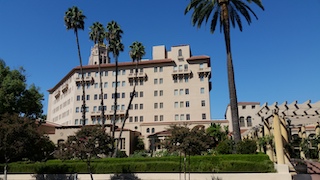Ho Sang Yim is a native and citizen of South Korea. He was admitted to the United States as a lawful permanent resident in 1983. In March 2010, he was arrested pursuant to a four-count complaint alleging grand theft auto, identity theft, falsifying financial statements and perjury when providing false information under penalty of perjury to the Department of Motor Vehicles. Yim eventually pleaded no contest to one count of perjury in violation of California Penal Code § 118(a).
Raul Borges Borba-Cardoso, a native and citizen of Portugal, was admitted to the United States as a lawful permanent resident in 1975. In 2004, Borba was convicted of perjury in violation of California Penal Code § 118(a) for testifying falsely during a judicial proceeding, and he was sentenced to three years in prison.
Orlando Velasquez is a native and citizen of Guatemala. He came to the United States on June 18, 1990. Once here, he amassed a significant criminal record, including a conviction for perjury in violation of Penal Code § 118(a) for providing false information, under penalty of perjury, to the California Department of Motor Vehicles.
Later, the Department of Homeland Security (DHS) initiated removal proceedings against Yim, Borba and Velasquez. Each was removable for having committed an “aggravated felony” by being convicted of Penal Code § 118(a). In each case, an immigration judge (IJ) found Yim, Borba and Velasquez removable as charged and, in each case, the Board of Immigration Appeals (BIA) affirmed.
Yim, Borba and Velasquez each appealed the BIA finding to the U.S. Court of Appeals for the Ninth Circuit in Pasadena, contending that perjury under Penal Code § 118(a) is not an “aggravated felony” because it is not “an offense relating to . . . perjury.”
 U.S. Ninth Circuit Court of Appeals Pasadena
U.S. Ninth Circuit Court of Appeals Pasadena
At this point, the reader may ask himself or herself if such an appeal is not the epitome of a meritless appeal. How could one appeal that a conviction for perjury is not an offense relating to perjury, after all?
The U.S. Court of Appeals respectfully evaluated the consolidated appeals in one case (Ho Sang Yim, et al. v. William P. Barr (2020 DJDAR 9304)), beginning with the observation that the term “aggravated felony” covers “offenses relating to . . . perjury . . . for which the term of imprisonment is at least one year.” 8 U.S.C. § 1101(a)(43)(S).
An alien convicted of an “aggravated felony” is removable (8 U.S.C. § 1227(a)(2)(A)(iii)) and is also ineligible for asylum (8 U.S.C. § 1158(b)(2)(A)(ii)) and cancellation of removal (8 U.S.C. § 1229b(a)(3)).
The question in the consolidated cases here, the Ninth Circuit observed, is whether perjury under California Penal Code § 118(a) is “an offense relating to . . . perjury.”
To answer that question, the Ninth Circuit put aside the apparently obvious match between perjury in the state court description of the crime and the federal use of the word perjury. Instead, it diligently applied the categorical approach from Taylor v. United States (1990) 495 U.S. 575.
The categorical approach involves a three-step approach for determining whether an offense is an “aggravated felony.” First, the court must identify the elements of the generic federal offense, which here is perjury, that is defined under 8 U.S.C. § 1101(a)((43)(S) and various federal opinions addressing perjury. The Ninth Circuit distilled all such opinions down to (1) making a material false statement (2) knowingly or willfully (3) while under oath or affirmation (on penalty of perjury) (4) where an oath is authorized or required by law.” Therefore, while writing a statement to the DMV was not in court under oath, the documents submitted by Yim and Velasquez were under oath nonetheless, like in court with Borba.
Second, the court must identify the elements of the specific crime of the conviction. Section 118(a) of the California Penal Code provides that perjury requires (1) taking an oath to testify, declare or certify truly (2) who then testifies, certifies or declares willfully as true any material matter which he or she knows is false is guilty of perjury.
Third, the court compares the statute of conviction to the general federal offense to determine “whether the specific crime of conviction meets . . . the definition of an aggravated felony.” Renteria-Morales v. Mukassey (9th Cir., 2008) 551 F.3d 1076. An aggravated felony under federal law covers “offenses relating to . . . perjury . . . for which the term of imprisonment is at least one year.” 8 U.S.C. § 1101(a)(43)(S).
Here, the Ninth Circuit found the state court definition of perjury was well within the federal definition of an aggravated felony so the removal orders were affirmed in all three cases.
We bring this summary to the reader’s attention for two reasons. First, it is commonly believed that an aggravated felony must involve violence or serious harm of some sort and this is simply not true. Second, there is test, the categorical approach, to answering whether a state court conviction falls within the scope of the federal definition of an aggravated felony.
The citation for the U.S. Ninth Circuit Court of Appeals ruling discussed above is Ho Sang Yim, et al. v. William P. Barr (9th Cir., 2020) 972 F. 3d 1069.
For more information about aggravated felonies under immigration law and crimes of moral turpitude under California law, please click on the following articles:
 U.S. Ninth Circuit Court of Appeals Pasadena
U.S. Ninth Circuit Court of Appeals Pasadena